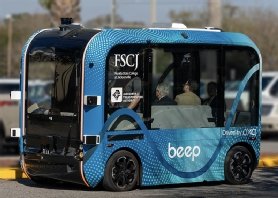
ZinetroN - Adobe
Oxa hails first commercial deployment of self-driving software
Culmination of 10 years of software engineering, hardware integration, machine learning and testing in the virtual and real worlds sees connected vehicle technology provider deliver automation in AV Shuttles in Florida, US.
In a move that the self-driving connected vehicle technology company says will see the code hit the road, Oxa has launched its first commercial Oxa Driver product in passenger shuttles in Jacksonville, Florida.
The service is being operated by US fleet operator Beep in partnership with Jacksonville Transport Authority (JTA) and the Florida State College at Jacksonville (FSCJ).
The shuttles are part of an autonomous vehicle (AV) programme licensed by the US National Highway Traffic Safety Administration (NHTSA). They support the JTA and FSCJ’s ambition to become beacons for autonomous transportation as the college builds AV skills into its academic track and the city begins major investment in autonomous transport as part of an Ultimate Urban Circulator Project.
The range of autonomous shuttle deployments is broad – from catalysing regeneration in downtown Jacksonville to serving science parks and well-established areas like Lake Nona in Orlando, Florida. Lake Nona is a 17-square-mile community known for integrating cutting-edge technology to optimise mobility and lifestyle options. This commitment to innovation has drawn in multiple Fortune 500 companies. The area is grounded on a gigawatt network infrastructure and is home to Wave Lake Nona, celebrated as the world’s most technologically advanced hotel.
Other city services yet to be announced in 2024 will be a mix of private and public transportation shuttles using a variety of vehicle types from fully customised to retrofitted commercial platforms.
“This initiative is a testament to years of hard work and collaboration between the private and public sectors, including the US Department of Transportation,” said JTA CEO Nat Ford. “We are eager for the FSCJ campus and the wider Jacksonville community to experience these AVs first-hand to see the benefits they bring.”

The shuttle services running Oxa Driver are being deployed in partnership with Oxa’s strategic US fleet operations partner Beep. The company is delivering programmes across six states in more than two dozen communities and is in the vanguard of deploying autonomy across North America.
“Our partnership with Oxa is off to a great start, and we’re very pleased with the results of our first autonomous shuttle deployment in Jacksonville, in concert with our partners at the Jacksonville Transportation Authority and Florida State College at Jacksonville,” added Beep CEO Joe Moye.
“Oxa Driver provides an enhanced passenger experience and elevated operational capabilities to further improve safety. We’re excited to expand the deployments of this joint solution, with six additional sites currently planned for 2024.”
Putting the launch into perspective, Oxa calculates the arenas of passenger shuttles and industrial logistics will form an addressable software market worth multibillions of dollars a year. This is based on the number of vehicles that can benefit from self-driving software, potential revenue per vehicle, and the commercial and technological viability of making the shift.
The launch makes Oxa the first and only British company exporting deployment-ready self-driving vehicle software to the global market. Oxa Driver is designed to enable vehicle automation independent of human control, but trained safety attendants will be used on the FSCJ route to boost confidence and trust while passengers get used to the self-driving experience. The first roll-out will be followed by seven more featuring Oxa software in cities across the US and UK in 2024.
“The AV market is in a really interesting place as the number of innovators begins to shrink in a battle of business and technology models,” said Gavin Jackson, CEO of Oxa.
“My view is AV technology won’t be commercially viable in cars or taxis for a decade so focus should shift to the mass movement of people and goods, specifically shared passenger systems such as the FSCJ shuttle, and industrial logistics. These sectors suffer from severe driver shortages, yet they also offer huge public and business benefits if they can be enhanced – and autonomy can do that in a cost-effective way now,” he added.
Read more about connected vehicles
- Cubic gains SoftBank investment for software-defined connected vehicles, IoT: Leading Japanese mobile network operator makes significant investment in connected vehicle software provider to accelerate growth of software-defined vehicle market and enter new sectors.
- UK government adds to autonomous vehicle funding: Members of the fifth connected vehicle technology development cohort given potential to receive funding from UK government to aid creation of services that could power self-driving vehicles.
- Software-defined vehicles market to be worth over $700bn by 2034: Research finds there is plenty of opportunity ahead for software-centric experiences surrounding connected vehicles, but warns that too many OEMs are continuing to equip vehicles with limited and sluggish tech.
- Software République unveils H1st vision connected vehicle: Consortium introduces ‘revolution’ in mobility, with connected vehicle bringing together 20 concrete operational innovations, offering a ‘true experience’ beyond automotive mobility.










